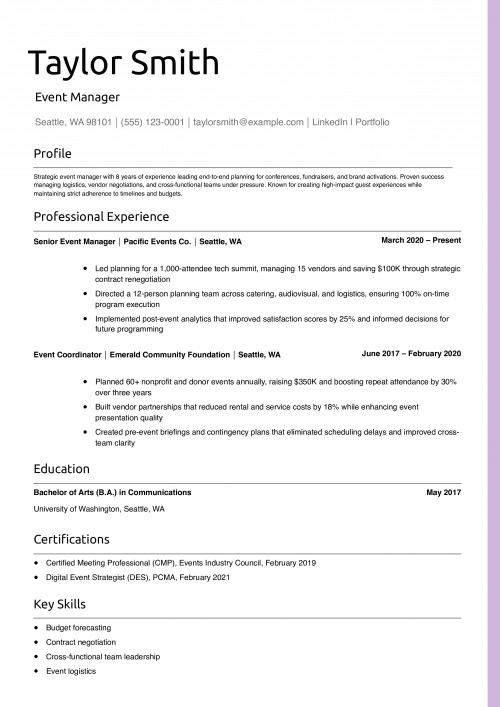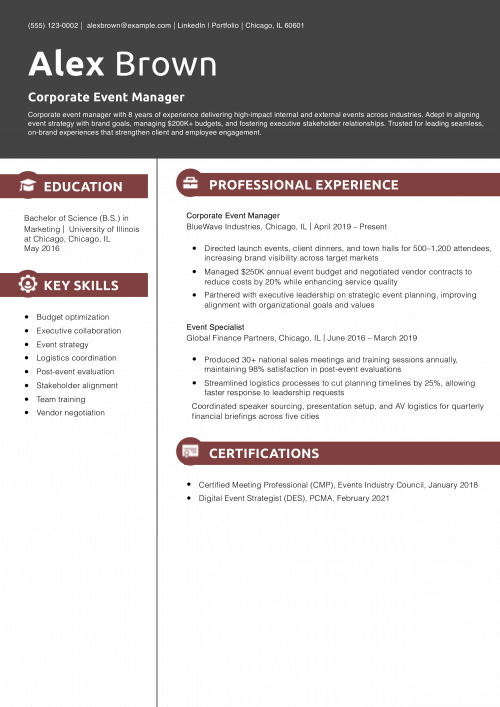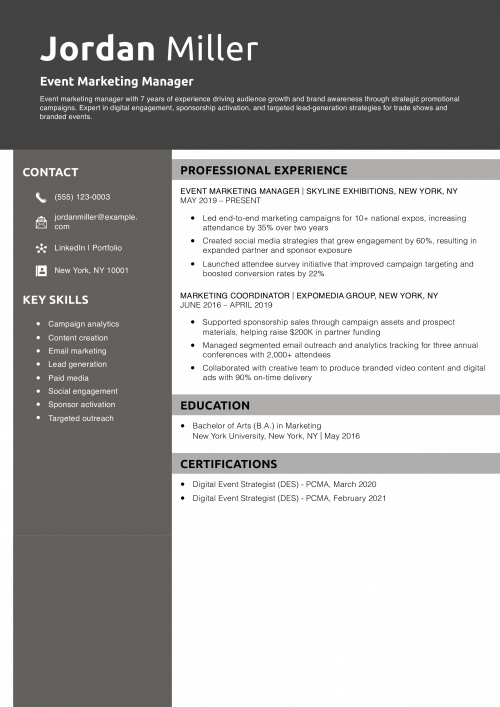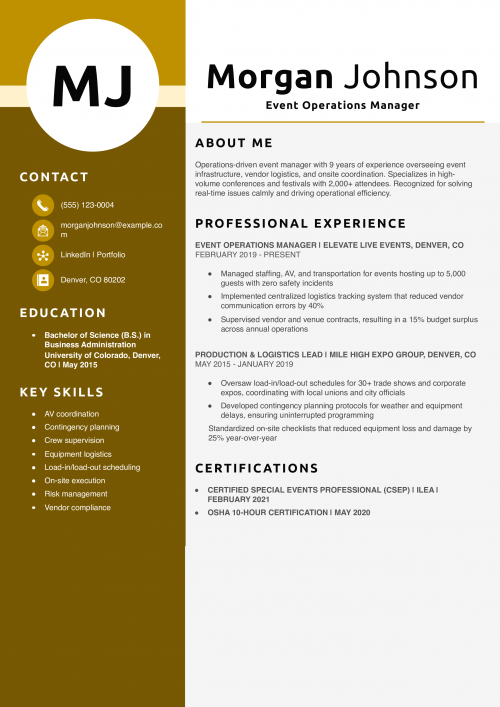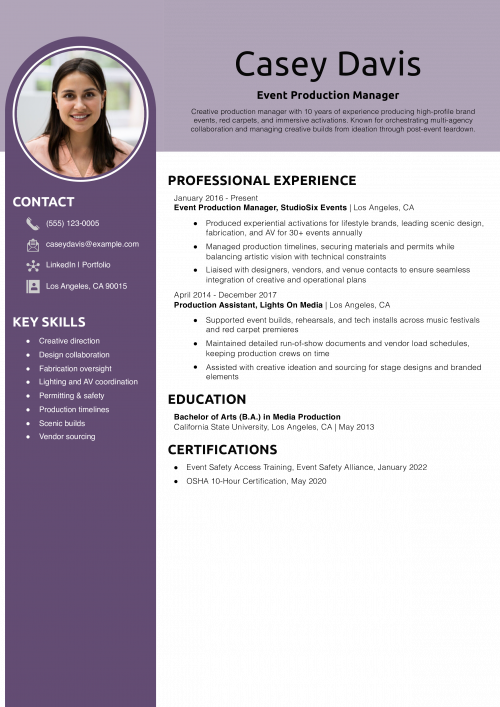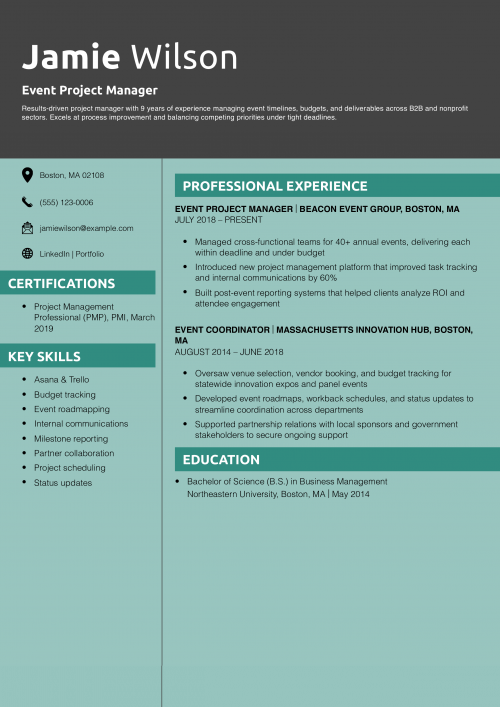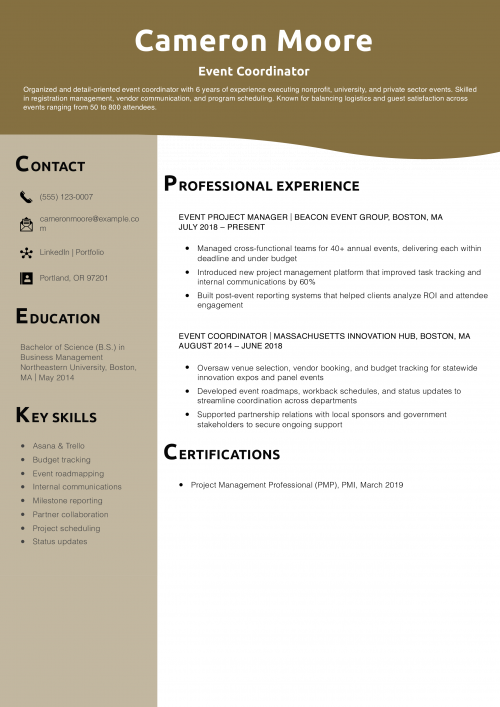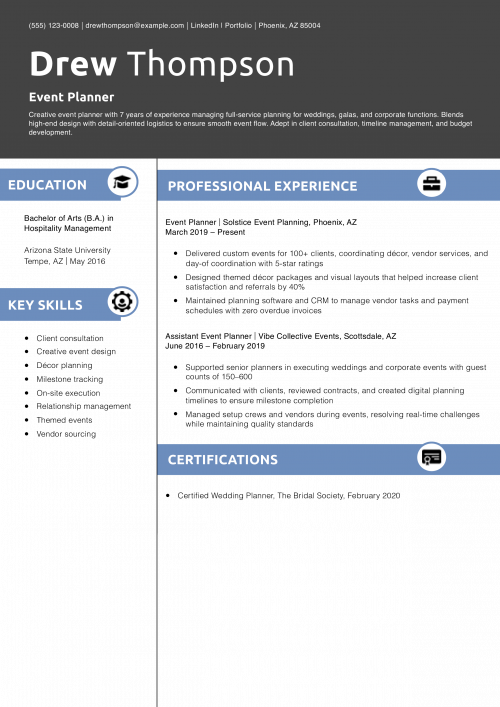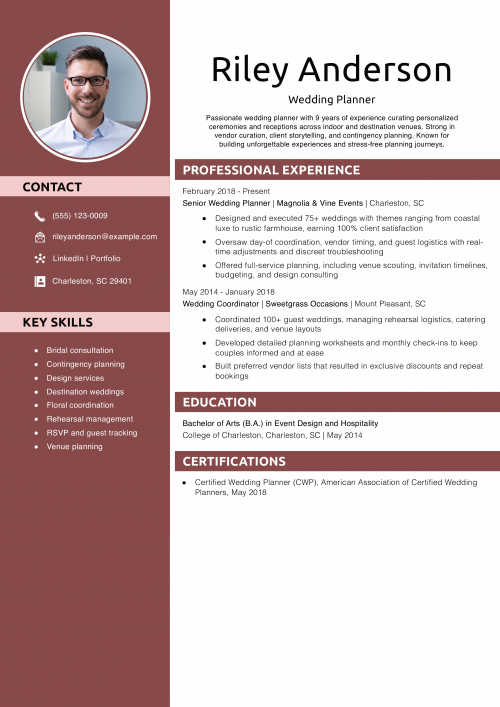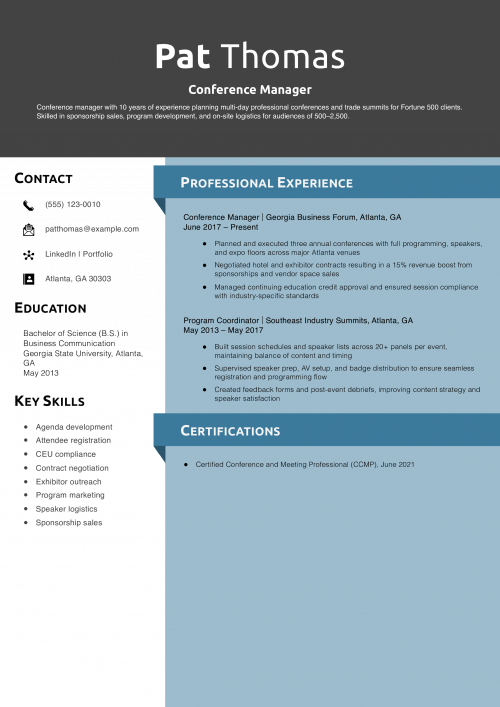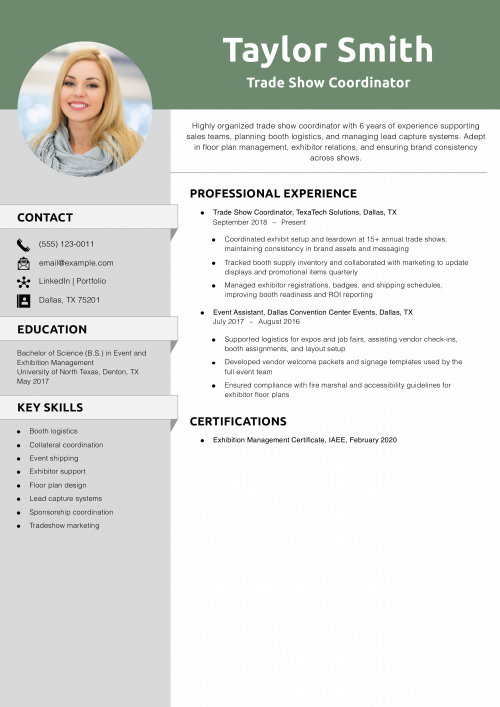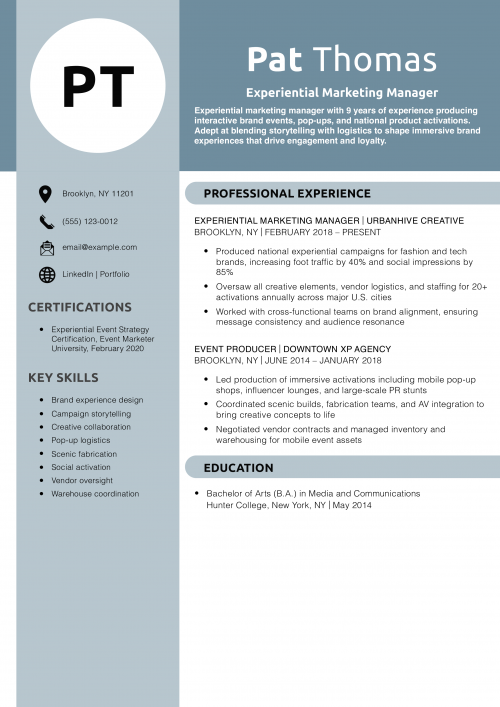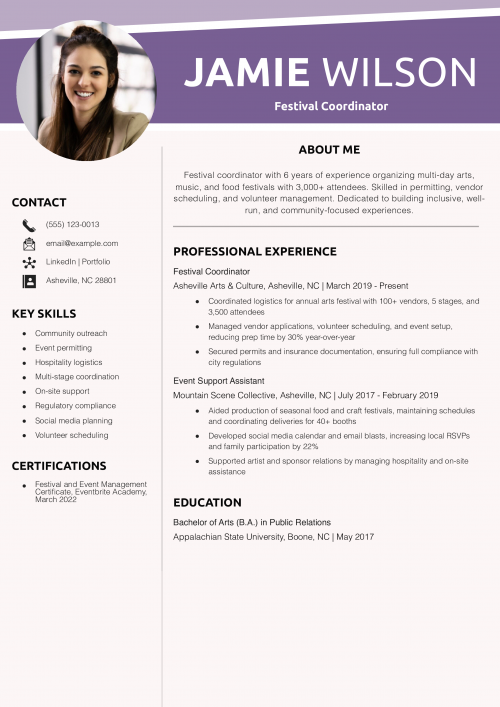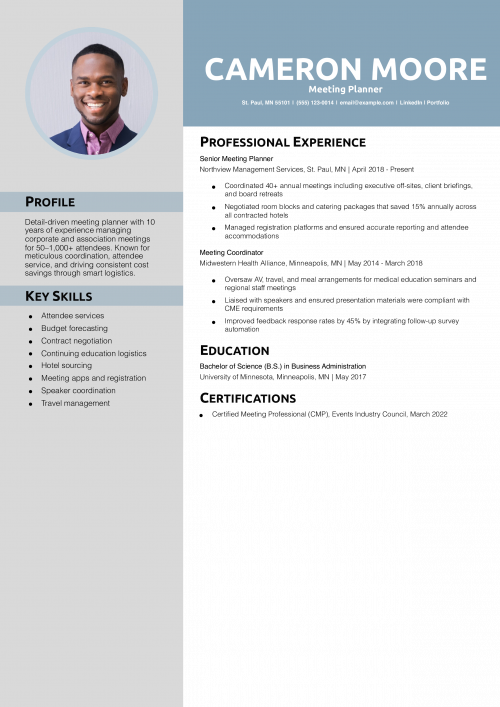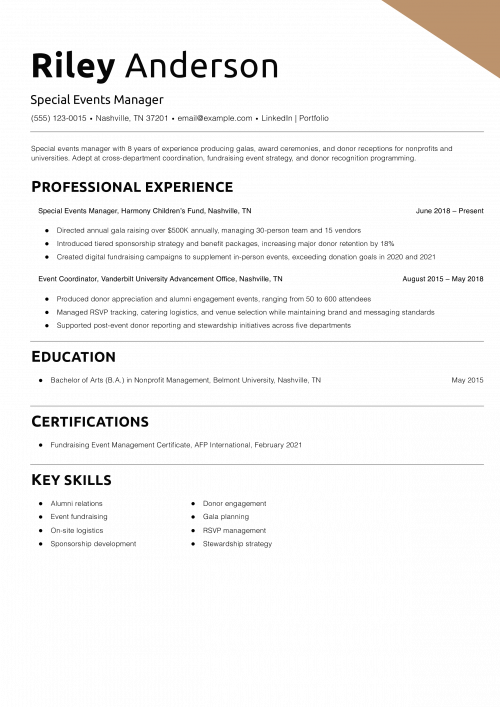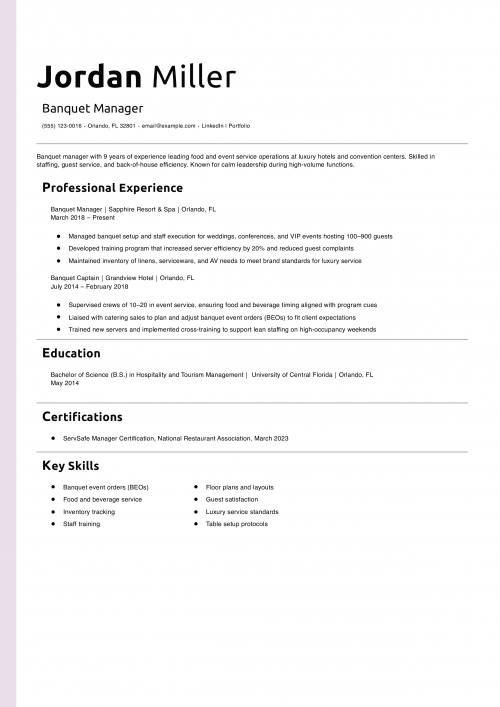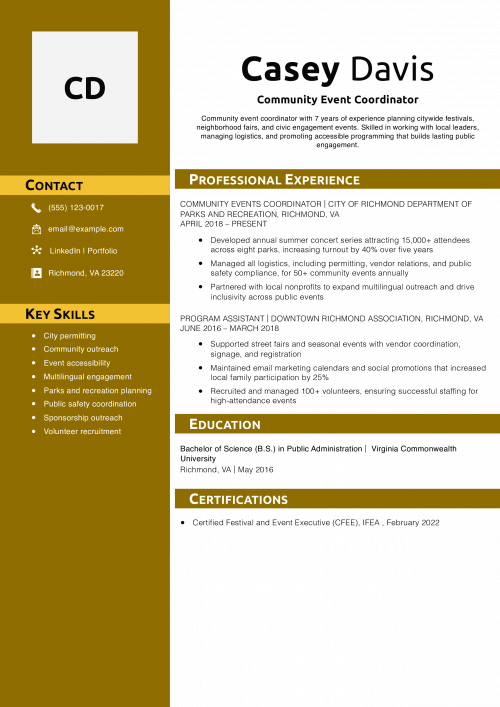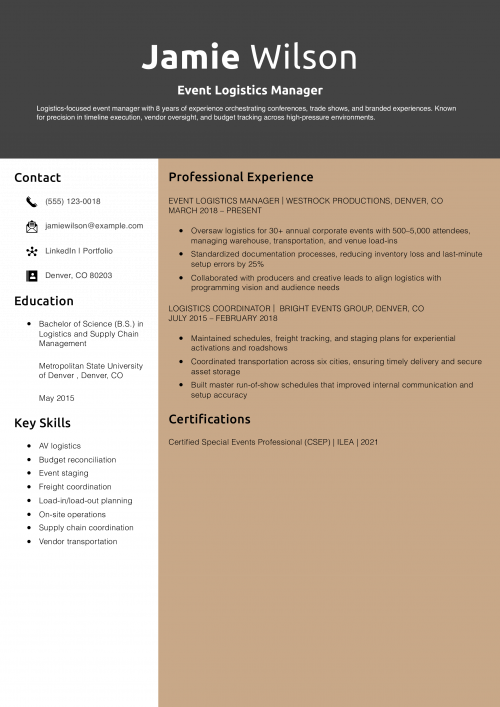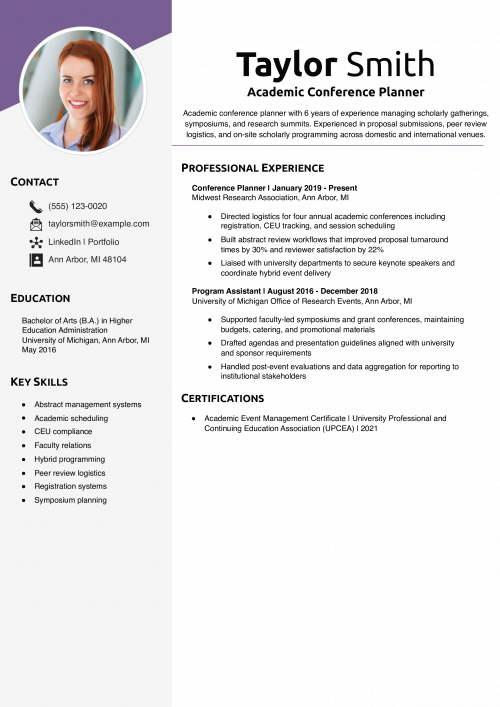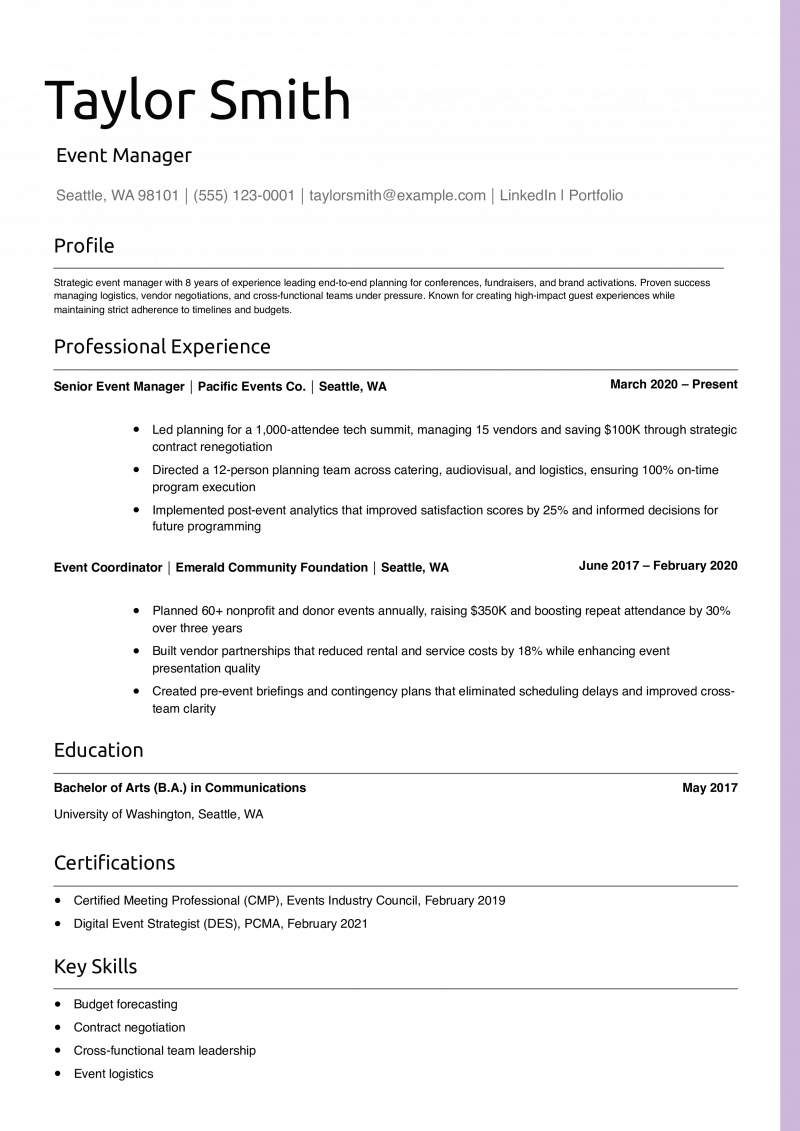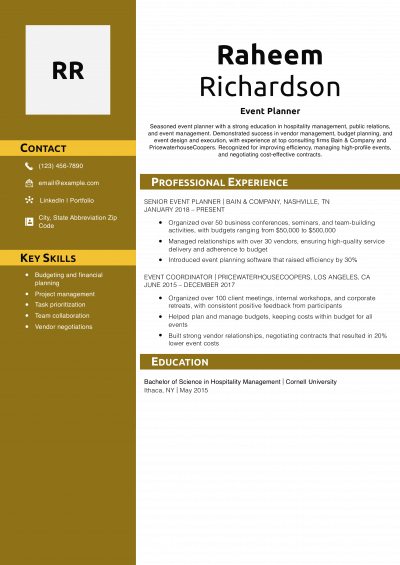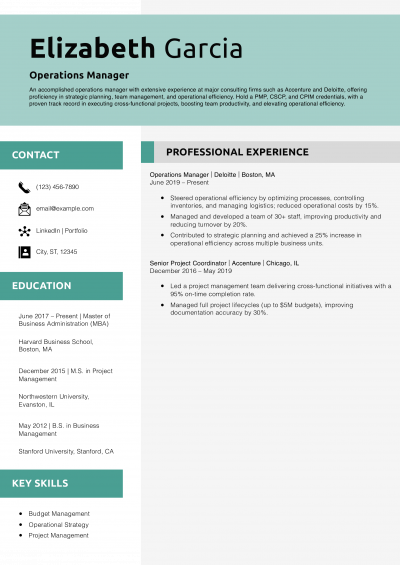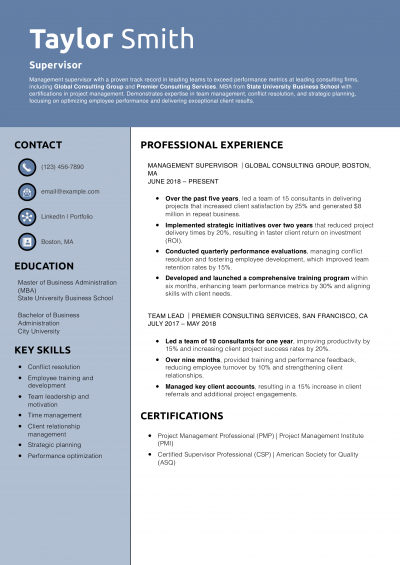In an increasingly competitive job market, you need to leverage every possible advantage to generate interviews. The first place to start is with your resume. As an event manager, your document should reflect your expertise in both logistics and hospitality. Paint a picture of your experience planning and managing large events. Showcase your ability to coordinate operations and identify opportunities to enhance the guest experience. In this guide, we’ll provide expert tips and insights to help you craft an accomplishment-driven resume.
Key takeaways:
- Showcase your event planning experience: Highlight the various types of events you’ve managed throughout your career. Demonstrate your ability to secure venues, maintain vendor relationships, and coordinate logistics.
- Quantify your achievements: Feature hard numbers and metrics to establish a sense of scope for the events you’ve organized, such as the number of attendees or the monetary value of the event budget.
- Optimize for the ATS: Include keywords and industry skills from the job posting to ensure compliance with applicant tracking systems (ATS), such as event planning, vendor management, and hospitality management.
Most Popular Event Manager Resumes
Event Manager Resume Example
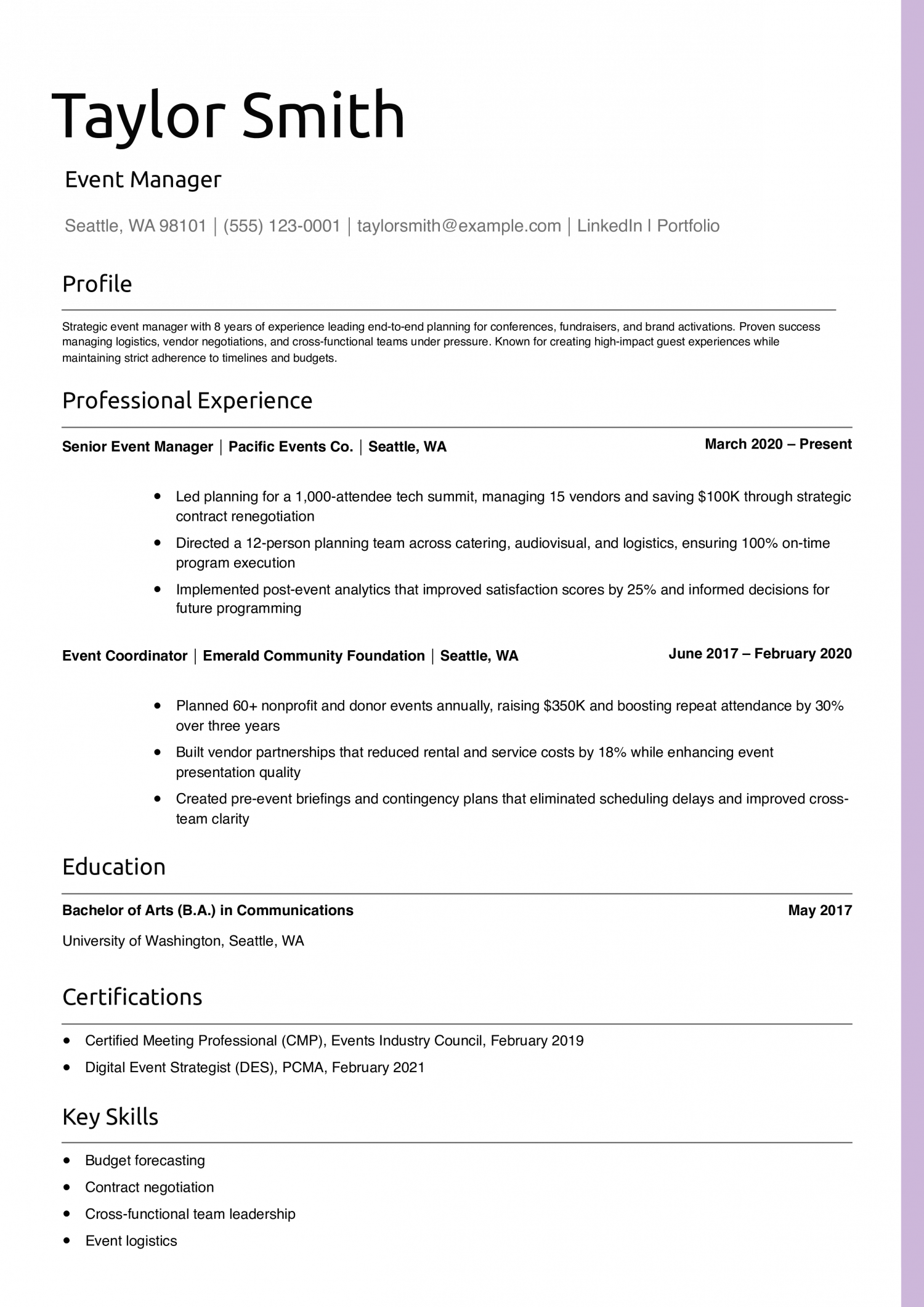
Why This Resume Is a Great Example
Taylor Smith’s resume delivers strong impact with quantified results and a clearly defined career timeline. Each bullet demonstrates leadership, financial acumen, or guest-focused planning. The profile sets the tone by showcasing Taylor’s ability to lead large-scale events while staying on budget and ahead of schedule. For more insights on building your resume, visit our guide.
Corporate Event Manager Resume Example
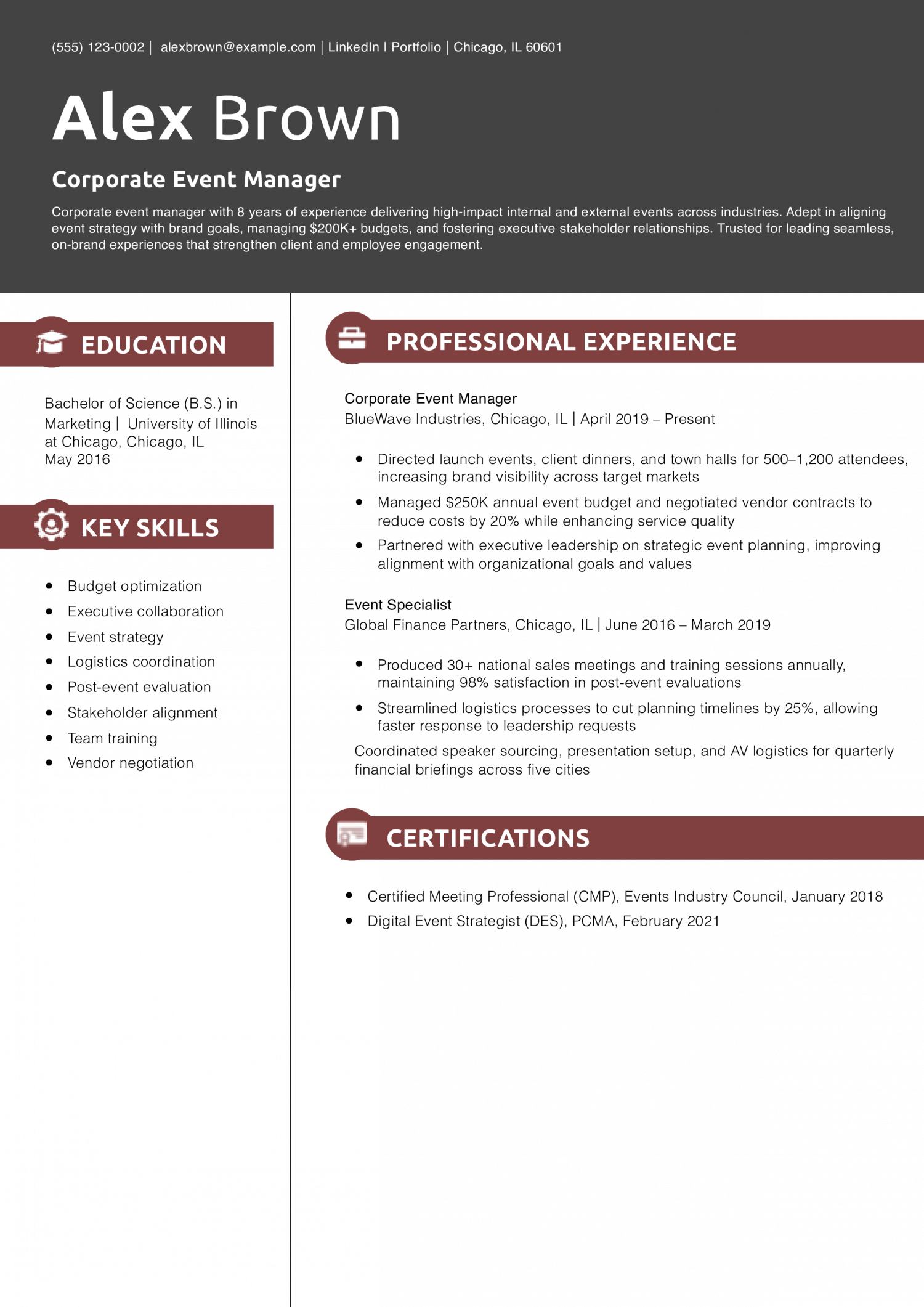
Why This Resume Is a Great Example
Alex Brown’s resume focuses on executive-facing events, strategic outcomes, and measurable cost savings. The bullet points reflect proactive leadership and high-level coordination. For more insights on building your resume, visit our guide.
Event Marketing Manager Resume Example
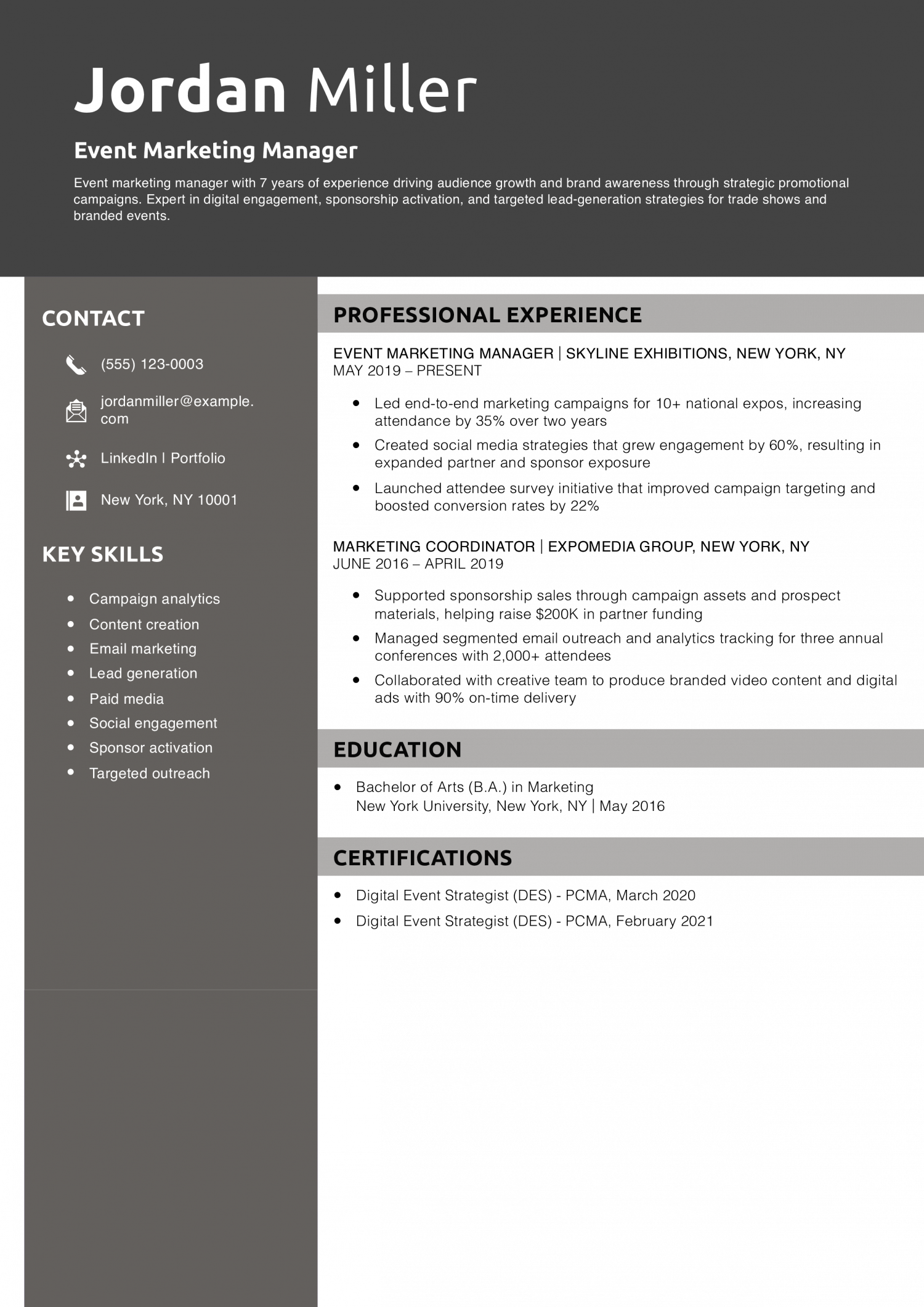
Why This Resume Is a Great Example
Jordan Miller’s resume blends marketing and event strategy with clear performance metrics. The social media and campaign focus aligns with modern event marketing demands. For more insights on building your resume, visit our guide.
Event Operations Manager Resume Example
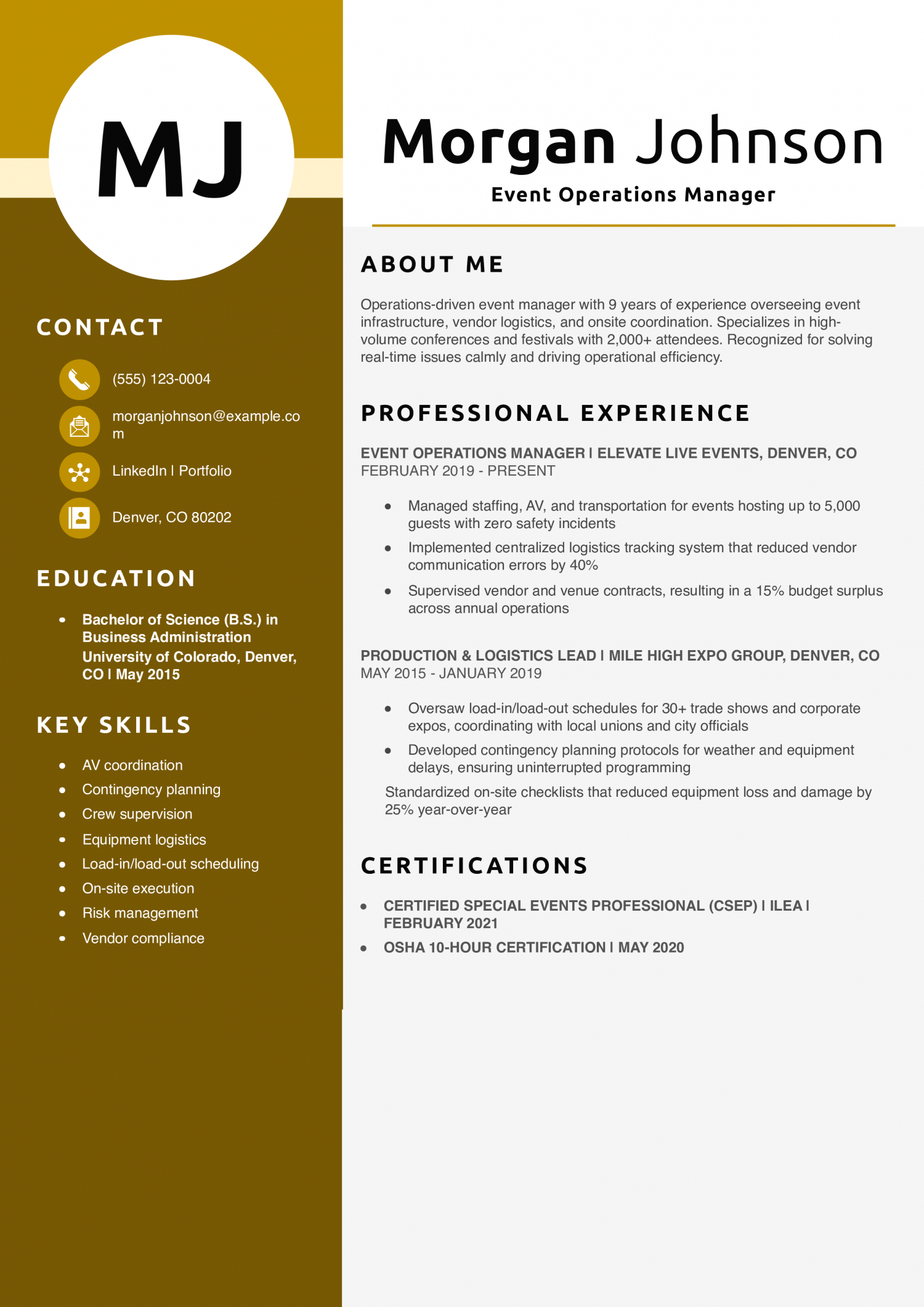
Why This Resume Is a Great Example
Morgan Johnson’s resume focuses on large-scale event execution with a clear emphasis on operations and safety. The experience is concrete, detailed, and logistics-heavy. For more insights on building your resume, visit our guide.
Event Production Manager Resume Example
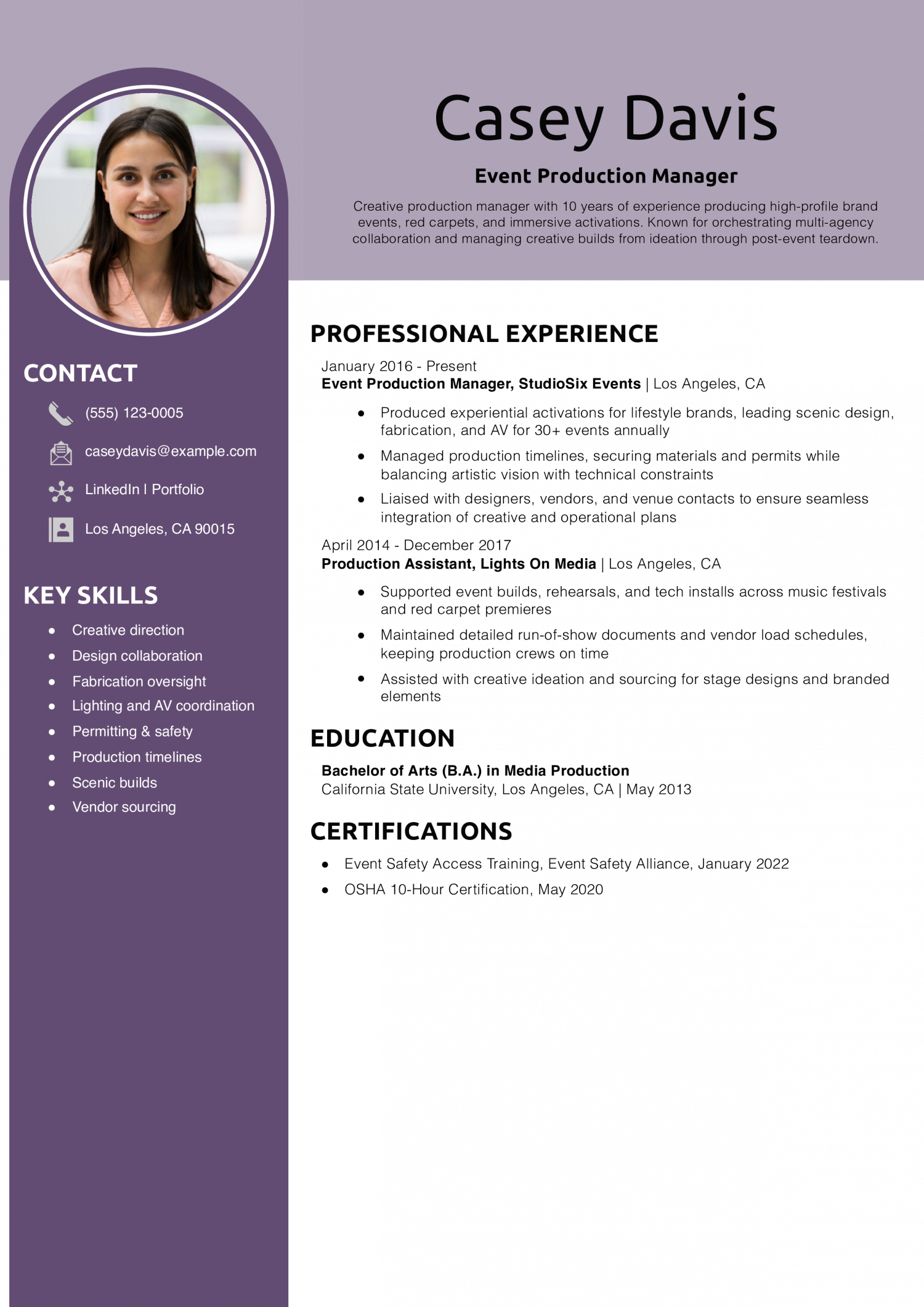
Why This Resume Is a Great Example
Casey Davis’s resume highlights experience at the intersection of creativity and logistics. Each bullet reinforces production-level coordination and a flair for execution. For more insights on building your resume, visit our guide.
Event Project Manager Resume Example
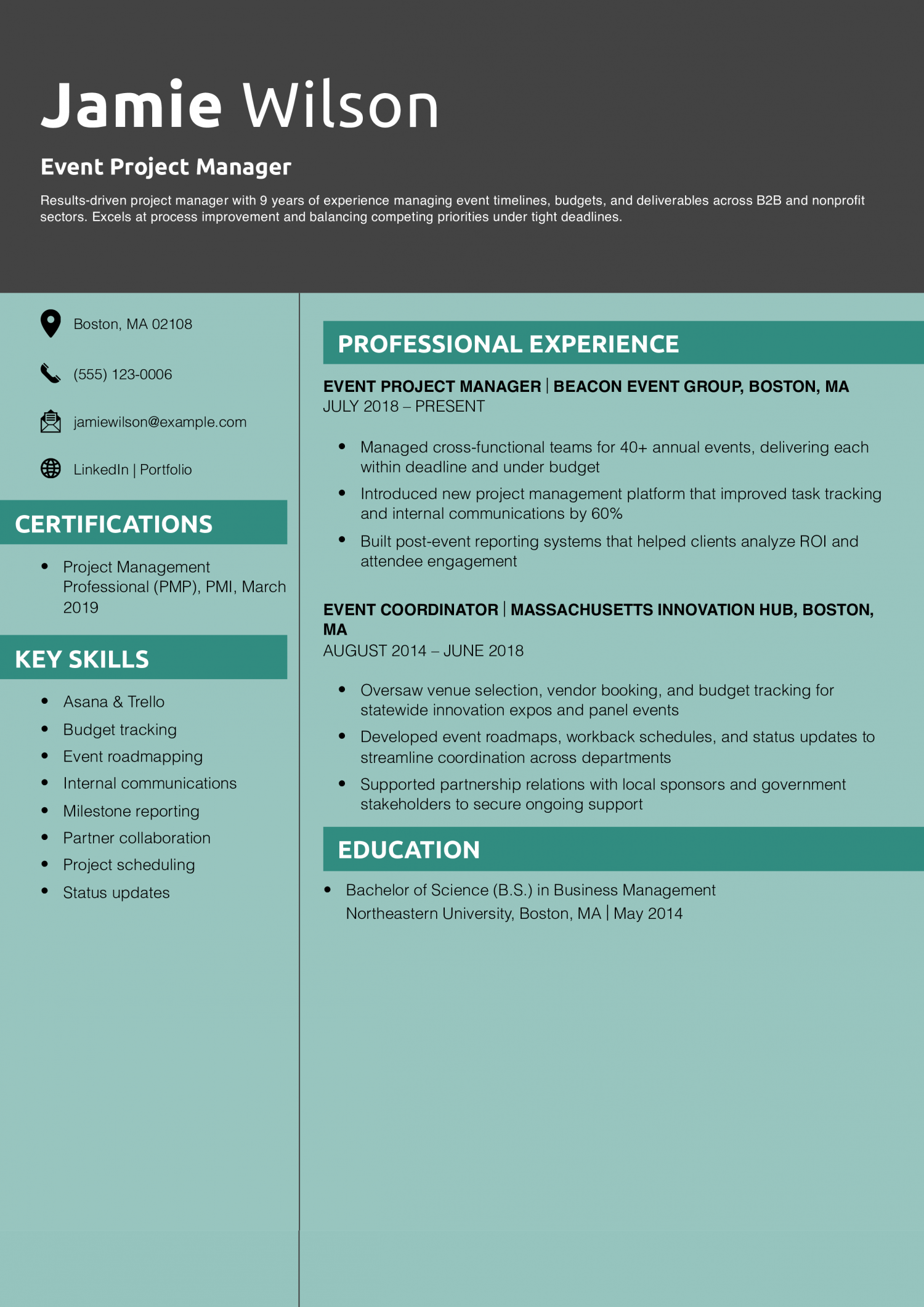
Why This Resume Is a Great Example
Jamie Wilson’s resume showcases strong project ownership, team coordination, and delivery metrics. It reflects the organizational skill set essential for project-based event roles. For more insights on building your resume, visit our guide.
Event Coordinator Resume Example
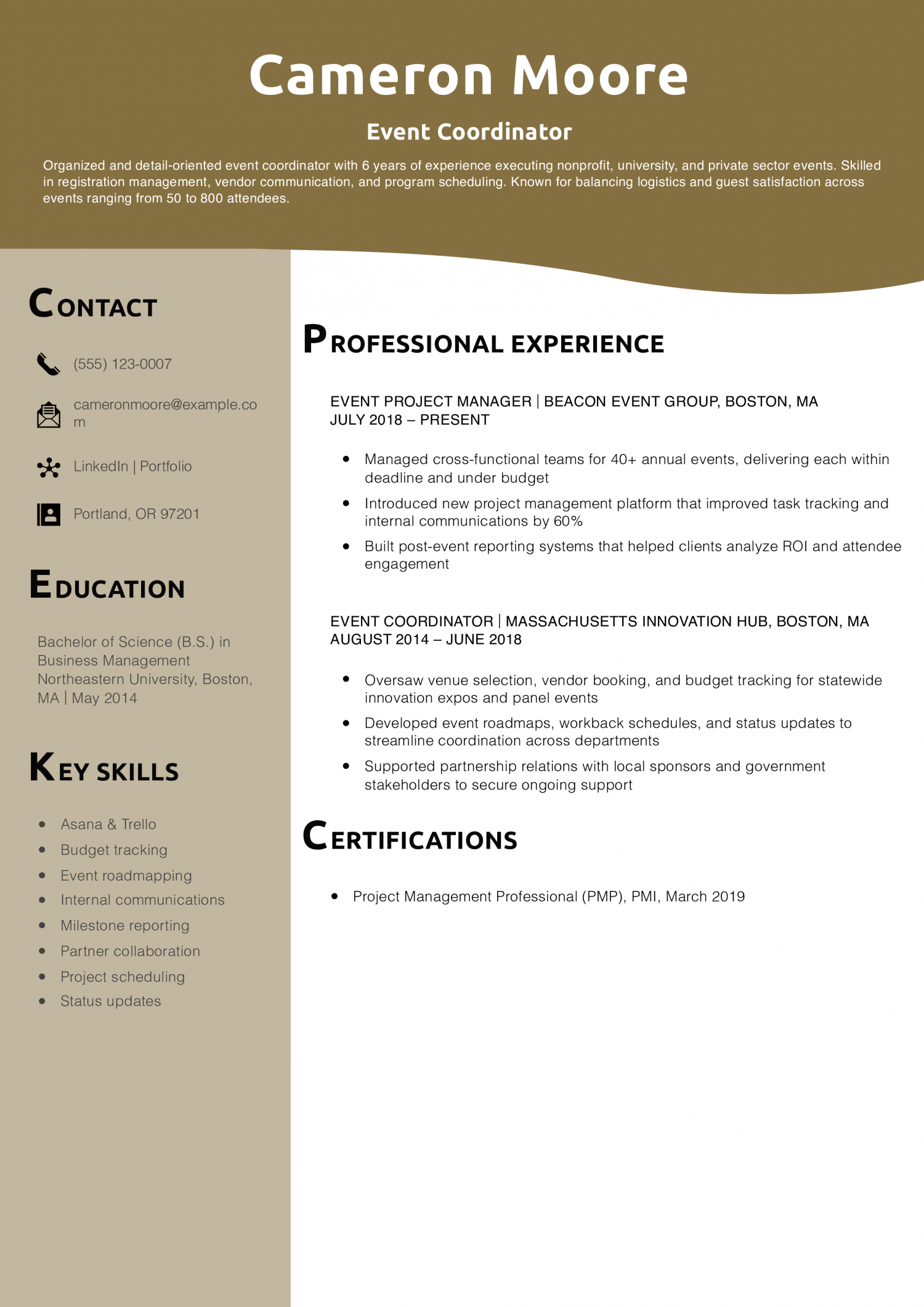
Why This Resume Is a Great Example
Cameron Moore’s resume shows strength in coordinating across multiple teams while improving logistics and engagement. Each bullet highlights outcomes that go beyond task descriptions. For more insights on building your resume, visit our guide.
Event Planner Resume Example
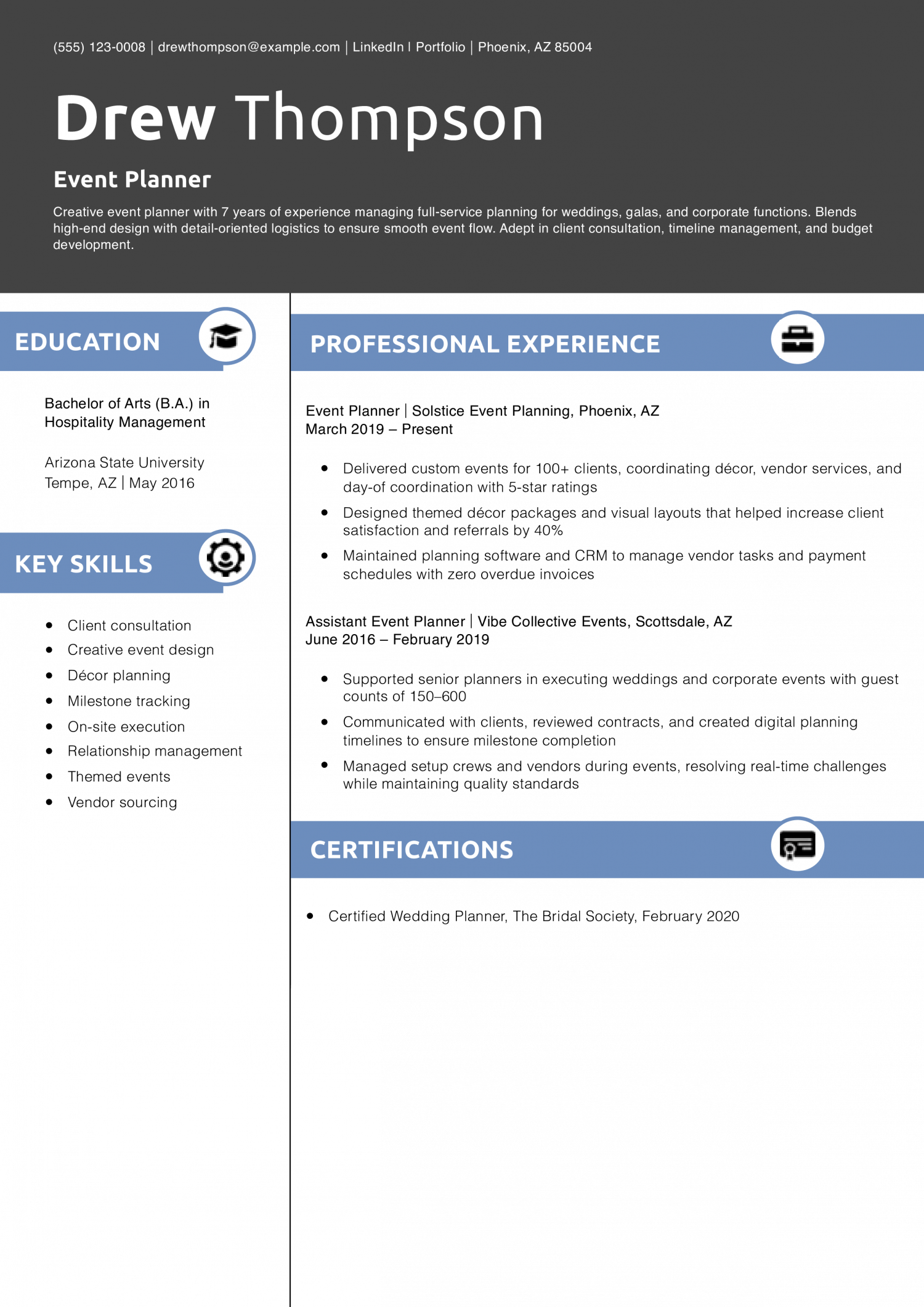
Why This Resume Is a Great Example
Drew Thompson’s resume blends visual creativity with strong vendor and CRM coordination. The bullets reinforce a hands-on, client-focused approach. For more insights on building your resume, visit our guide.
Wedding Planner Resume Example
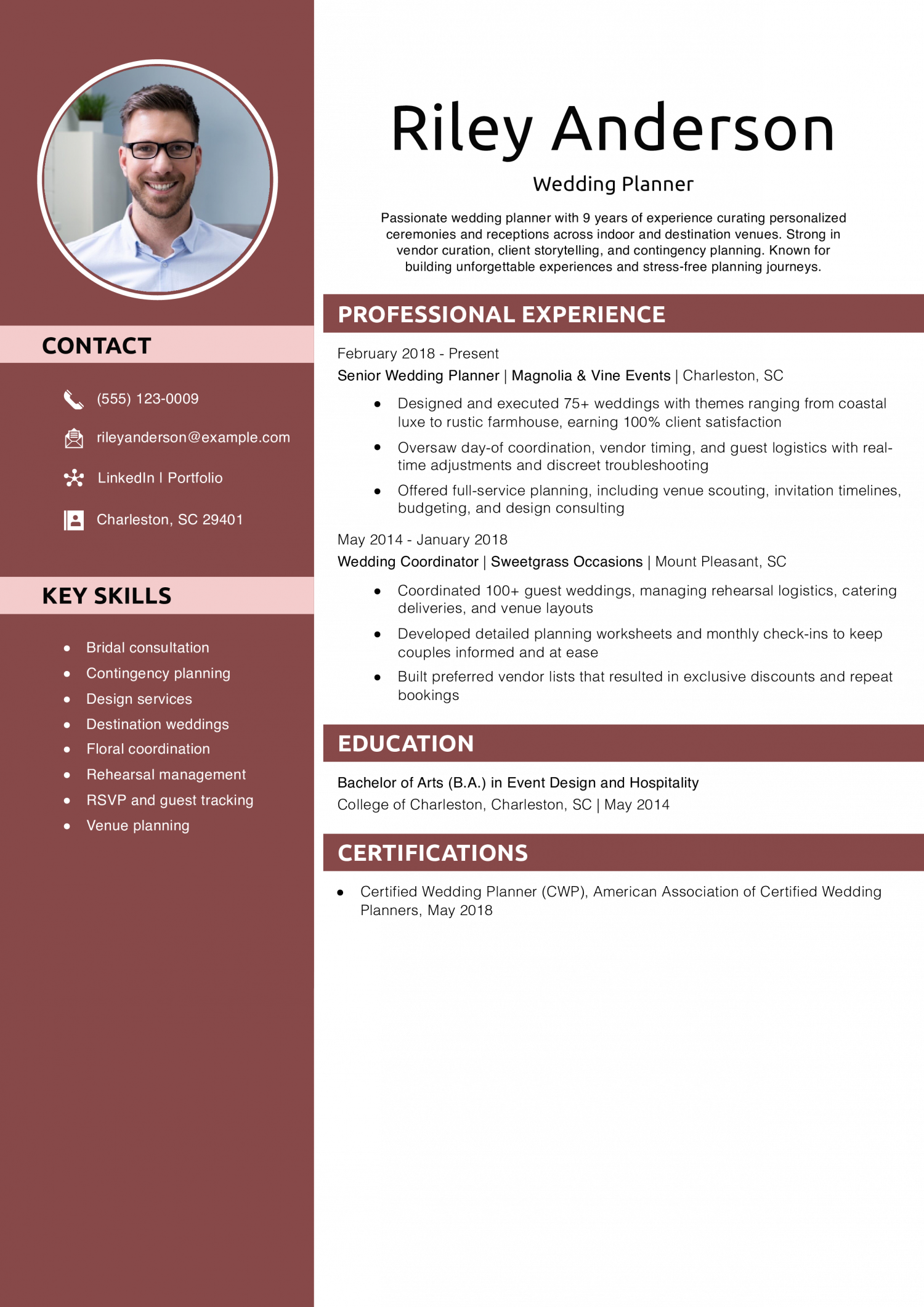
Why This Resume Is a Great Example
Riley Anderson’s resume captures the emotion, logistics, and visual planning required for weddings. It demonstrates a blend of practical execution and personal touch. For more insights on building your resume, visit our guide.
Conference Manager Resume Example
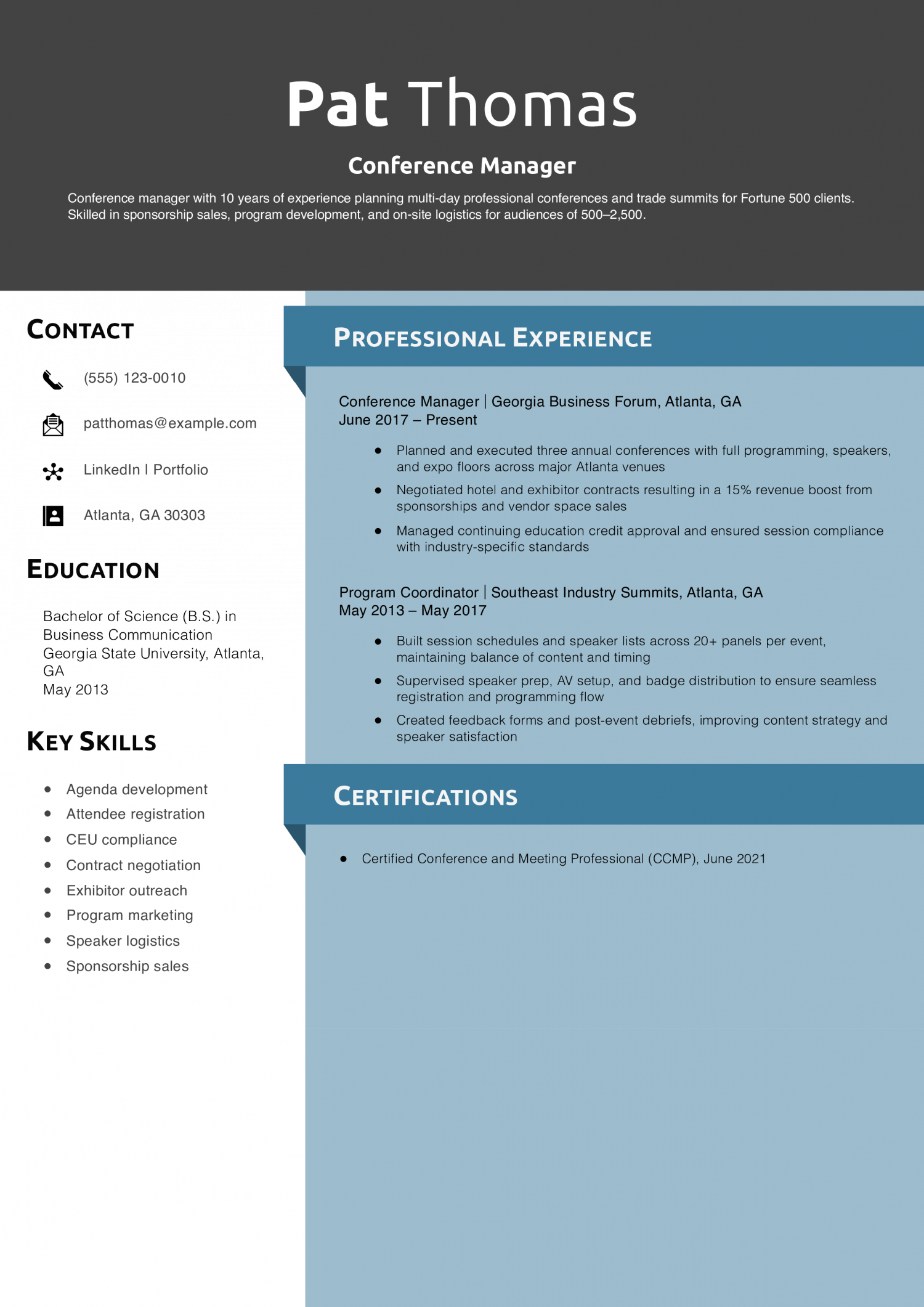
Why This Resume Is a Great Example
Pat Thomas’s resume reflects command over large-scale conferences and compliance-driven planning. Their experience touches both the attendee and sponsor experience. For more insights on building your resume, visit our guide.
Trade Show Coordinator Resume Example
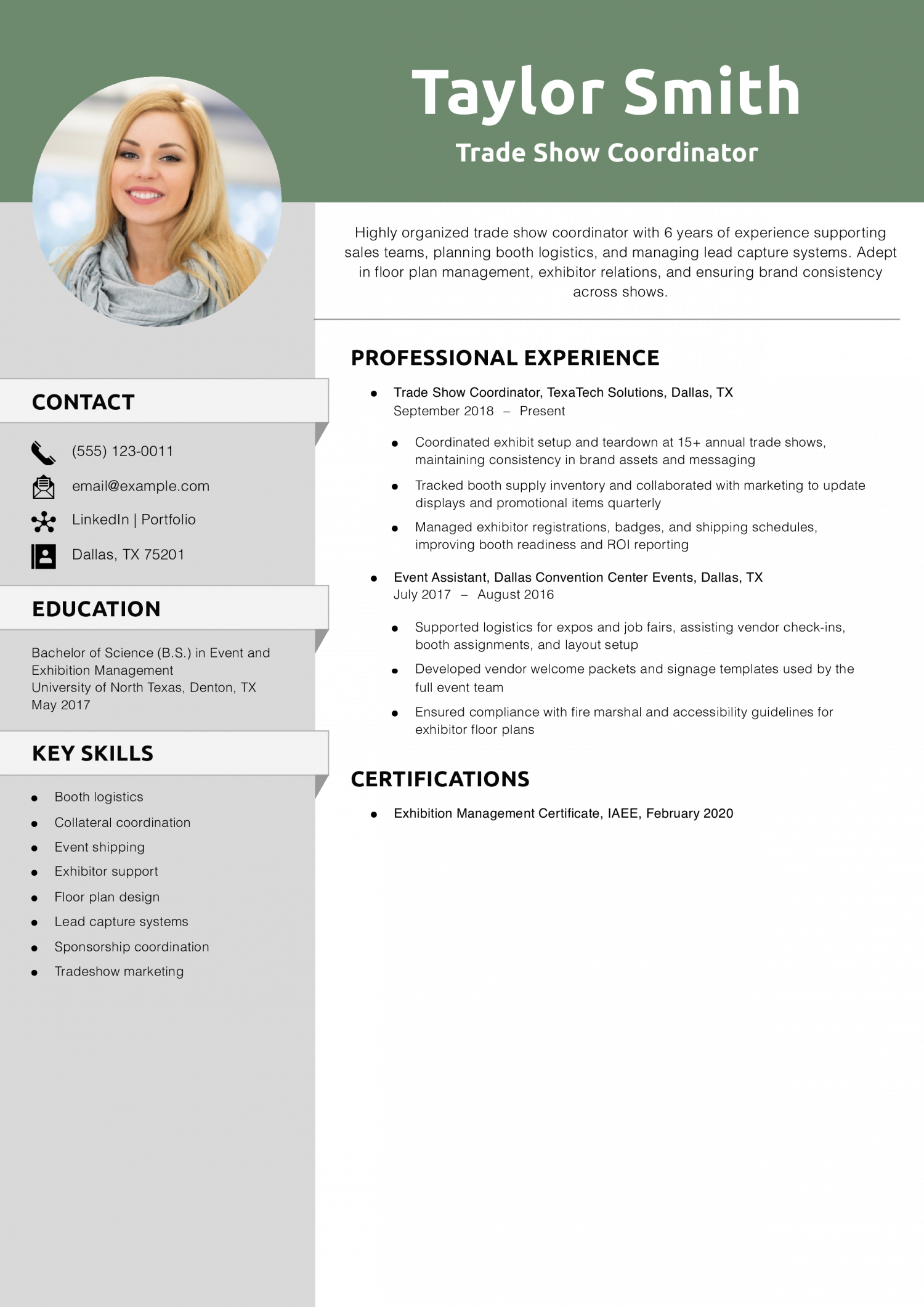
Why This Resume Is a Great Example
Taylor Smith’s resume is tailored to the unique logistics and branding needs of trade shows. The role-specific skills and systems experience are clear and measurable. For more insights on building your resume, visit our guide.
Experiential Marketing Manager Resume Example
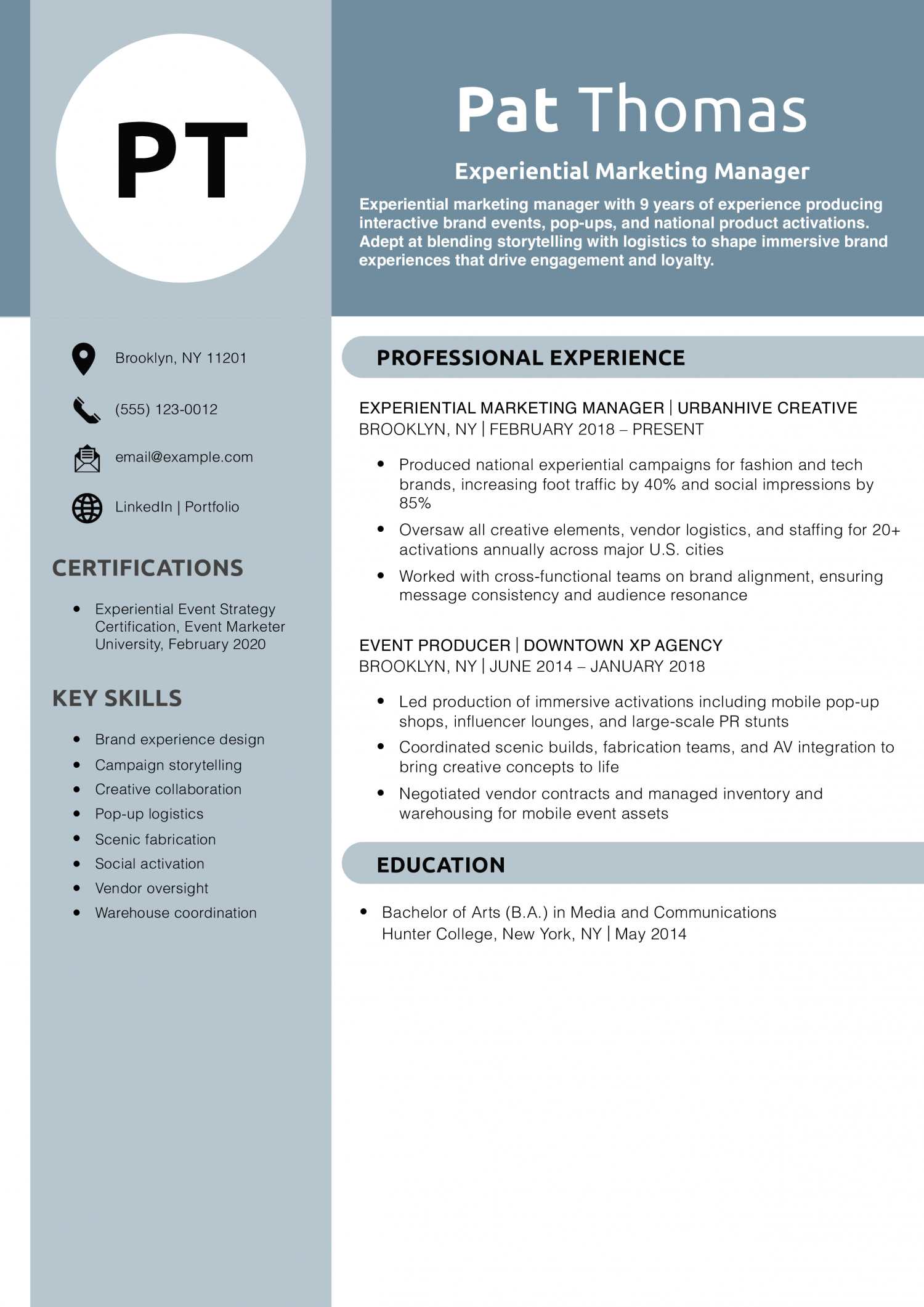
Why This Resume Is a Great Example
Pat Thomas’s resume highlights creativity alongside operational expertise in experiential campaigns. It speaks directly to roles that combine brand identity and logistics. For more insights on building your resume, visit our guide.
Festival Coordinator Resume Example
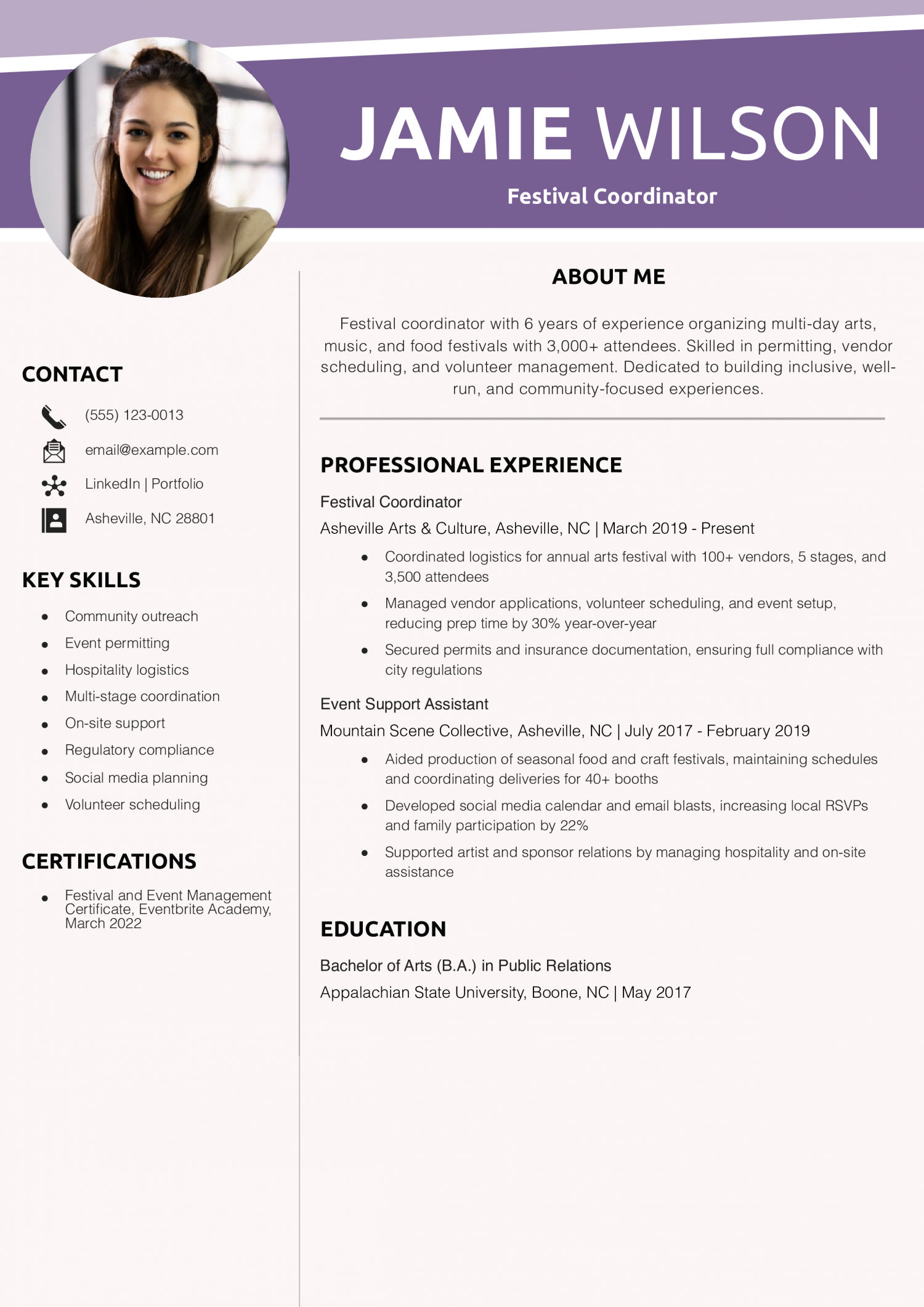
Why This Resume Is a Great Example
Jamie Wilson’s resume reflects experience with high-attendance community events and hands-on planning. It offers clarity and breadth across pre-event and day-of coordination. For more insights on building your resume, visit our guide.
Meeting Planner Resume Example
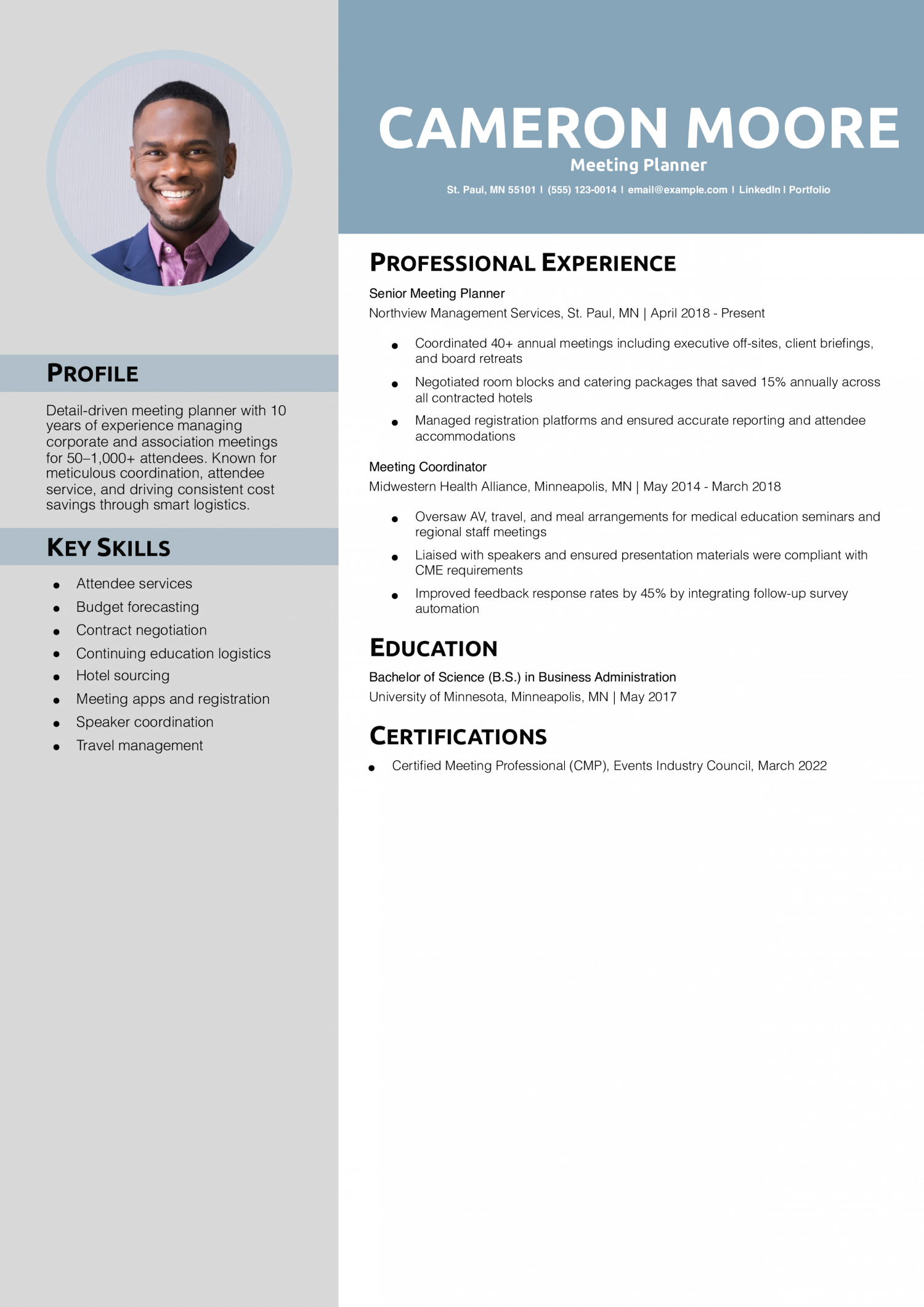
Why This Resume Is a Great Example
Cameron Moore’s resume shows a clear command of the technical and logistical needs of professional meetings. Each bullet reflects both planning and client service excellence. For more insights on building your resume, visit our guide.
Special Events Manager Resume Example
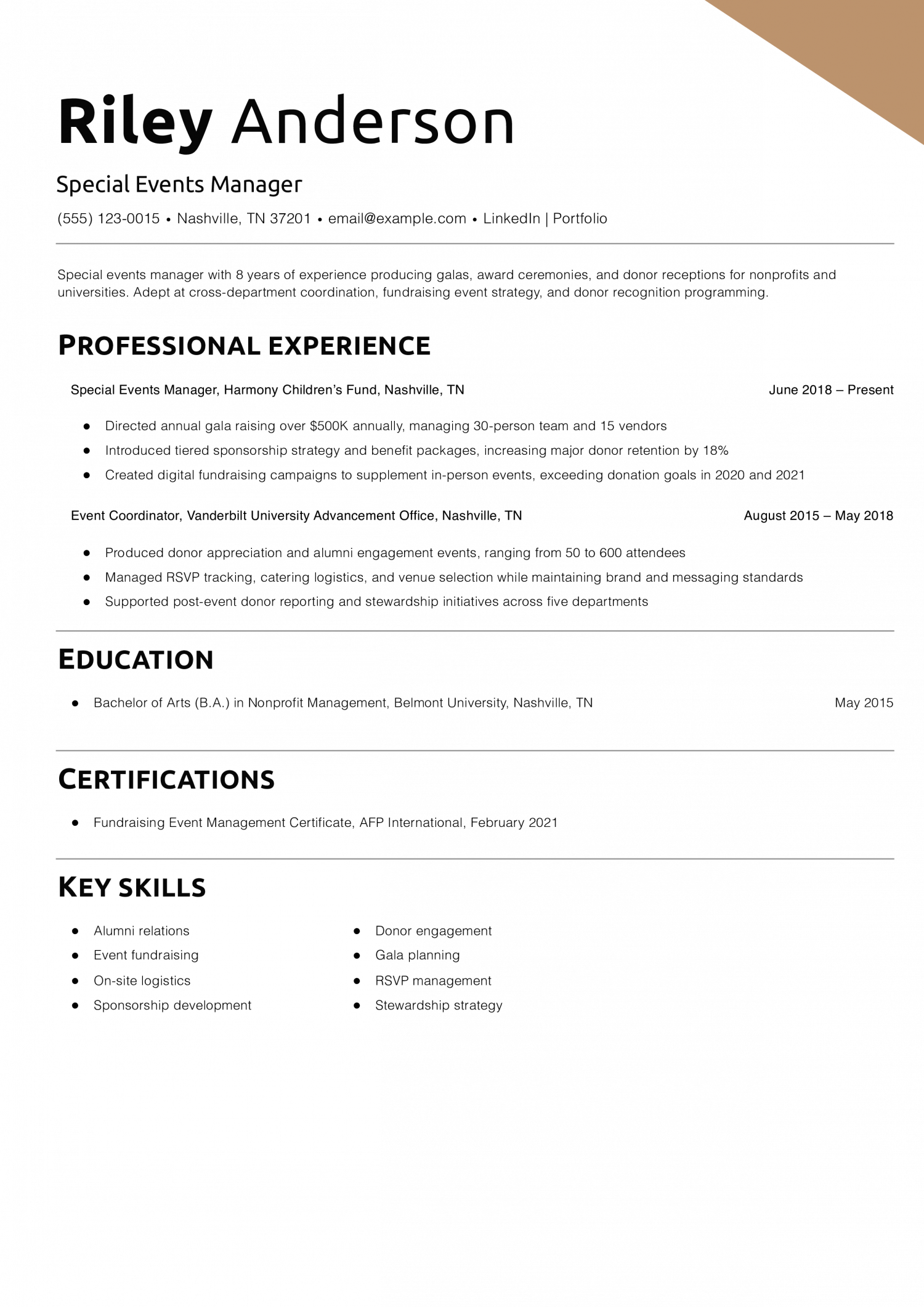
Why This Resume Is a Great Example
Riley Anderson’s resume highlights a consistent history of fundraising success and strategic donor events. It balances purpose-driven outcomes with operational details. For more insights on building your resume, visit our guide.
Banquet Manager Resume Example
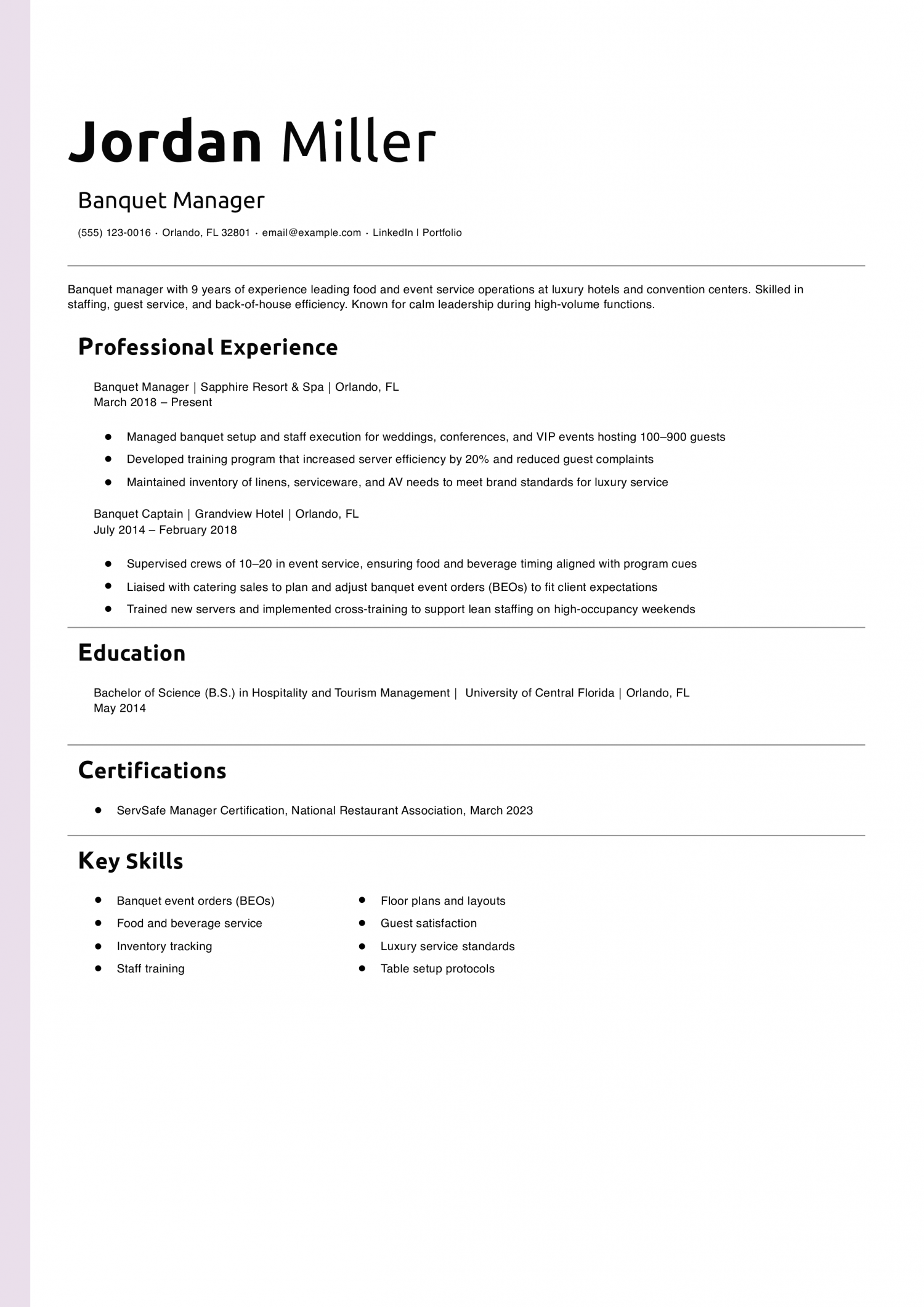
Why This Resume Is a Great Example
Jordan Miller’s resume centers on banquet logistics and hospitality excellence. It’s ideal for roles requiring hands-on service management. For more insights on building your resume, visit our guide.
Community Event Coordinator Resume Example
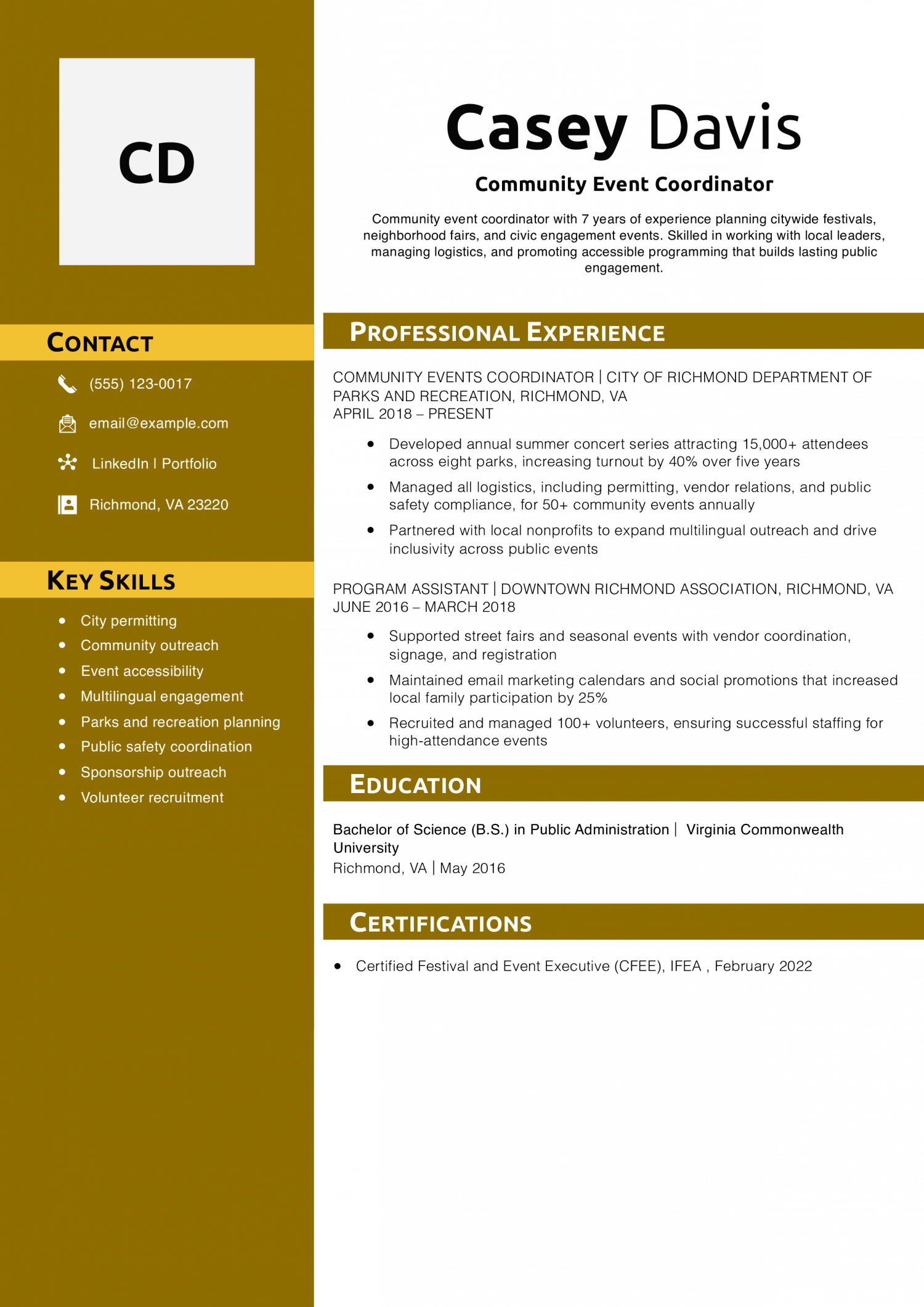
Why This Resume Is a Great Example
Casey Davis’s resume centers public service and inclusivity, offering meaningful context around civic engagement and logistics. It communicates community impact through measurable growth and partnerships. For more insights on building your resume, visit our guide.
Event Logistics Manager Resume Example
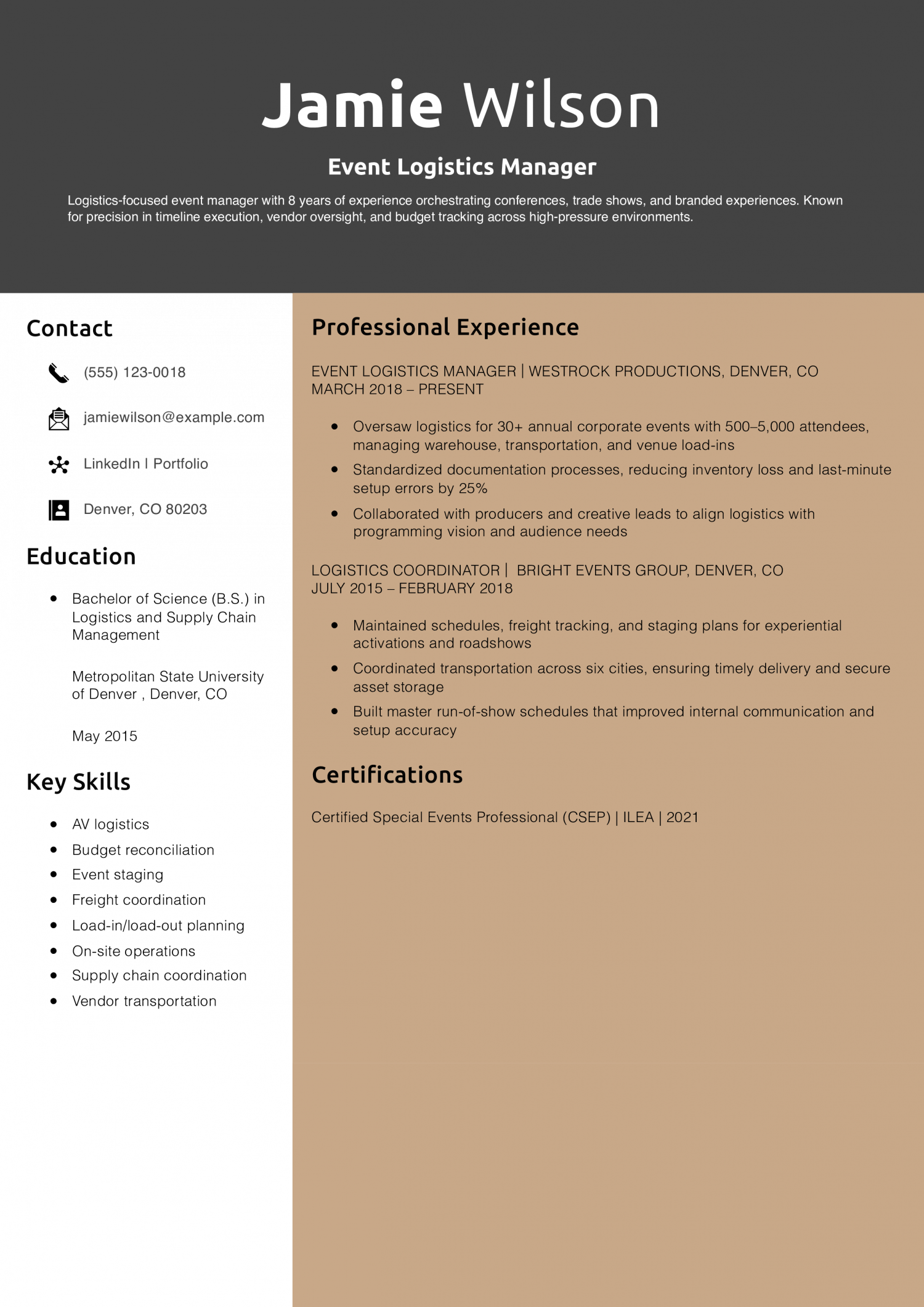
Why This Resume Is a Great Example
Jamie Wilson’s resume blends logistics expertise with real-world event execution. Each bullet speaks to coordination, timeliness, and team communication—key for operational event roles. For more insights on building your resume, visit our guide.
Entertainment Event Producer Resume Example

Why This Resume Is a Great Example
Morgan Johnson’s resume connects entertainment production with polished planning. The focus on VIP coordination and high-visibility event flow demonstrates confidence and experience under scrutiny. For more insights on building your resume, visit our guide.
Academic Conference Planner Resume Example
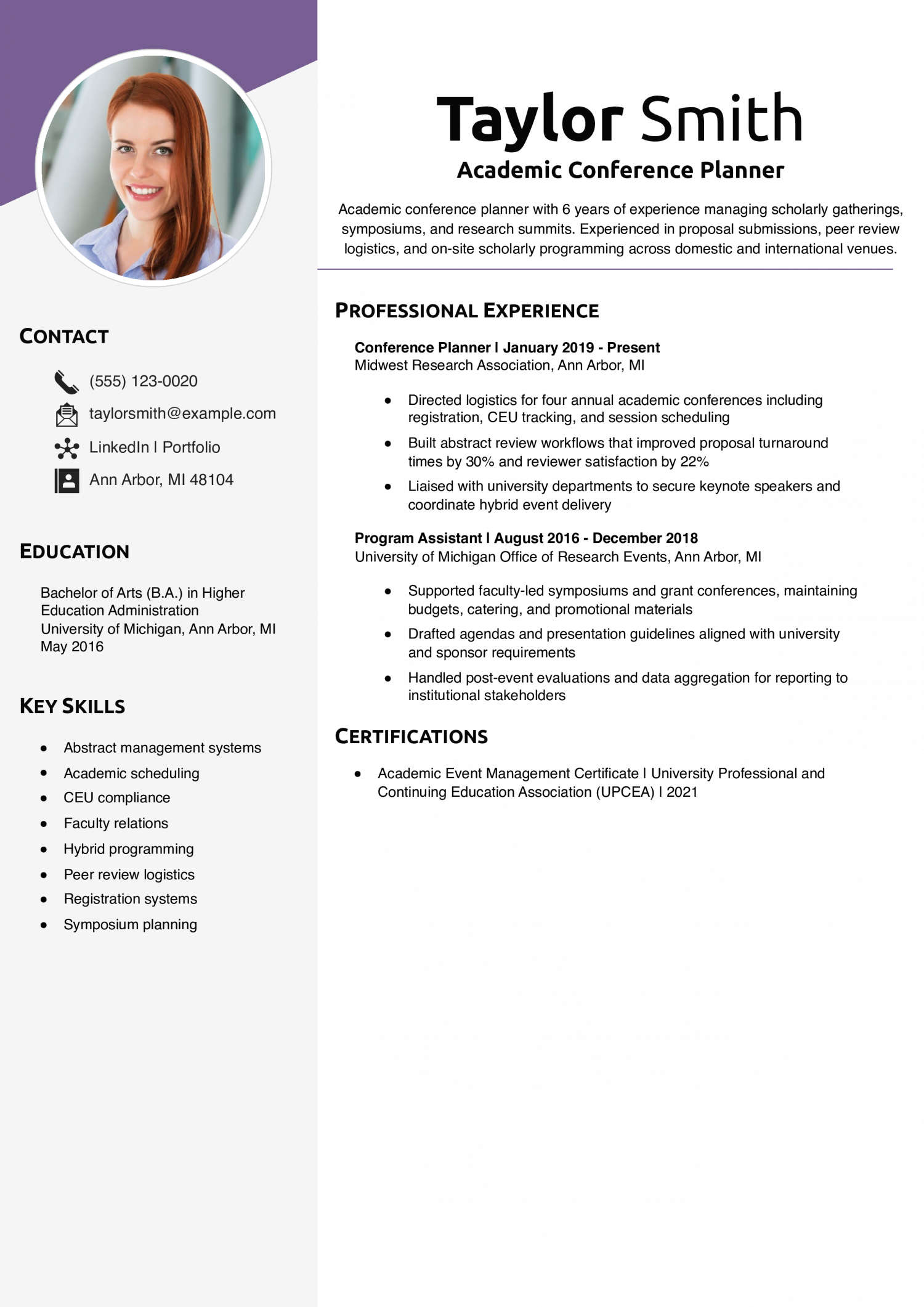
Why This Resume Is a Great Example
Taylor Smith’s resume reflects the specialized knowledge required for academic event planning. It combines research, compliance, and scholarly outreach for a well-rounded professional story. For more insights on building your resume, visit our guide.
Event Manager Text-Only Resume Examples and Templates
How To Write an Event Manager Resume Example
As an event manager, you understand how to coordinate logistics through rigorous planning and organization. You should apply this same mindset when building your resume, as it’s important to have a structure in place that allows the hiring manager to easily navigate your qualifications and experience. As a general rule, your resume template you should always contain the following sections:
- Contact information
- Profile
- Key skills
- Professional experience
- Education and certifications
1. Share your contact information
Include your full name, phone number, email address, location, and a URL for your LinkedIn profile. Carefully review the accuracy of your contact information to ensure hiring managers can easily reach out to schedule you for an interview.
Example:
YOUR NAME
[email protected] | (555) 123-4567 | Denver, CO 80201 | LinkedIn | Portfolio
2. Write a compelling profile summarizing your event manager qualifications
Lead with a powerful opening summary that provides a compelling overview of your background in event management and hospitality. Start with a sentence that lists your title, years of experience, and three to four industry-specific skills that the organization is looking for. Round out your introduction by highlighting some of your most impressive achievements to show potential employers how you can bring value to their team. For example, if you have a background in managing large events with over 700+ attendees, be sure to feature this information directly in your profile.
Senior-Level Profile Example:
Event manager with 10+ years of experience planning and executing conferences, fundraisers, and executive retreats for Fortune 500 clients. Adept in budget management, cross-functional team leadership, and full-cycle event logistics for audiences of 500–2,000 attendees.
Entry-Level Profile Example:
Event coordinator with two years of experience assisting in venue setup, scheduling, and vendor communications for nonprofit events and private functions. Focused on supporting seamless event execution and client satisfaction through strong organization and planning.
3. Add a results-driven professional experience section
During the hiring process, it’s the strength of your work history that carries the most weight. Avoid simply detailing mundane job duties and daily tasks. Potential employers want to see tangible examples of how you’ve excelled as an event manager over the course of your career. Your professional experience section should paint a vivid picture of what you’ve accomplished and the results you generated for previous organizations.
In addition to detailing the events you’ve managed, be sure to provide insights into your leadership capabilities. As an event manager, your role requires collaboration with vendors, cross-functional teams, and event staff on a daily basis. This shows the hiring manager that you have the event planning background and interpersonal skills to thrive in the position.
Resume writer’s tip: Quantify your experience
Feature hard numbers, data, and monetary figures to establish a sense of scale for the reader. For example, if you managed a large event, include the number of attendees and total size of the budget. You could also emphasize how you successfully generated cost savings by negotiating vendor contracts or building long-term relationships with venues.
Do
- "Reduced event logistics costs by 18% by renegotiating vendor contracts and optimizing transportation schedules."
Don’t
- "Responsible for coordinating event logistics."
Resume writer’s tip: Tailor your resume for each application
To increase your odds of landing the interview, take the extra time to customize your resume for each individual job application. This involves more than simply integrating keywords that match the posting. You also need to show the hiring manager how you leveraged these industry skills in real-world situations. For instance, if a role requires a strong background in vendor management, provide clear examples of how you built relationships with vendors and ensured compliance with contractual obligations to execute high-quality events.
What if you don’t have experience?
Without hands-on experience, it’s unlikely you can apply for an event manager role. That said, you can craft a resume that leverages your internships, certifications, skills, and academic projects to position you for event coordinator jobs. For instance, if you help organize fundraisers or conferences during college, highlight these experiences to show employers that you’re prepared for an entry-level role within the hospitality industry.
4. Include relevant education and certifications
Although a bachelor’s degree in hospitality management isn’t always required for event manager jobs, obtaining one can be beneficial to your long-term career prospects. You can also further bolster your application by featuring widely recognized industry certifications. For instance, if you plan on specializing in virtual events, consider pursuing a Digital Event Strategist credential from the Professional Convention Management Association.
Education
Template:
[Degree Name] | [Graduation Date]
[School Name] | [City, ST]
Example:
Bachelor of Arts (B.A.) in Hospitality Management | May 2018
University of Nevada | Las Vegas, NV
Certifications
Template:
[Certification Name] | [Awarding Organization] | [Completion Date]
Examples:
- Certified Meeting Professional (CMP) | Events Industry Council | 2020
- Digital Event Strategist (DES) | PCMA | 2022
5. List hospitality management and interpersonal skills
Most companies utilize applicant tracking systems (ATS) to identify qualified candidates and streamline the hiring process. If your resume lacks a certain number of keywords from the job description, your application may be rejected before it reaches an HR professional. To get through the initial screening phase, include a comprehensive list of skills that match the posting. Be sure to feature a mix of industry terms and interpersonal skills to show hiring managers that you’re a versatile candidate who can manage operations and communicate effectively with guests, clients, and vendors.
| Examples of key skills: | |
|---|---|
| Budget management | Contract negotiation |
| Digital event strategy | Event logistics |
| Event management | Event marketing |
| Fundraising event coordination | Guest list management |
| Hospitality management | Logistics |
| On-site coordination | Operations management |
| Project management | Stakeholder communication |
| Strategic planning | Team leadership |
| Vendor management | Venue sourcing |
| Virtual events | |
Resume writer’s tip: Use common action verbs
Utilizing action verbs is a great way to add a dynamic and engaging element into your writing. Incorporating proactive language allows the hiring manager to better visualize your contributions, allowing you to take proper ownership of your professional accomplishments. Conversely, passive language such as “assisted,” “helped,” or “responsible for,” diminishes the role you played in coordinating events, framing your efforts as job duties instead of achievements.
| Examples of action verbs: | |
|---|---|
| Built | Collaborated |
| Communicated | Coordinated |
| Drove | Enhanced |
| Executed | Identified |
| Implemented | Improved |
| Led | Managed |
| Negotiated | Organized |
| Oversaw | Planned |
| Promoted | Secured |
| Streamlined | Supervised |
| Tracked | |
How To Pick the Best Event Manager Resume Template
Look for a resume template that clearly organizes your information and emphasizes results. Use bold headings, bullet points, and clean spacing to guide the reader’s eye through your experience. Avoid overly decorative designs that distract from your content. Choose a layout that supports your personal brand—whether you focus on corporate events, nonprofit functions, or creative productions.
Frequently Asked Questions: Event Manager Resume Examples and Advice
According to the Bureau of Labor Statistics, job openings for event planners are expected to grow by 7% between 2023 and 2033. Although long-term prospects for this career path are positive, the most lucrative opportunities will always invite the strongest competition. To give yourself the best chance of receiving the interview, it's essential to align your resume with the job description.
For example, say a company is targeting an event manager with an extensive background in marketing. In this situation, emphasize how you successfully promoted events using social media campaigns or other digital advertising channels. Highlight how your marketing efforts directly translated into an increased attendance rate.
Reverse chronological is the ideal format for event managers. This approach places your most recent experience towards the top of your resume, allowing the hiring manager to quickly view your career progression. A combination format is better suited for entry-level candidates who need to compensate for a limited work history by featuring internships and academic projects, making it a poor choice for this type of application.
Include a cover letter with your resume
Once you’ve completed your resume, consider pairing it with a strong cover letter. This adds a personal touch to your application, allowing you to market yourself directly to potential employers. Be sure to mention something specific about the company’s reputation, culture, or mission and why this draws you to apply for the position. This shows that you’ve taken the time to research the organization beforehand and demonstrates your genuine interest in the role.
Check Out Related Examples
Resume Templates offers free, HR approved resume templates to help you create a professional resume in minutes. Choose from several template options and even pre-populate a resume from your profile.

